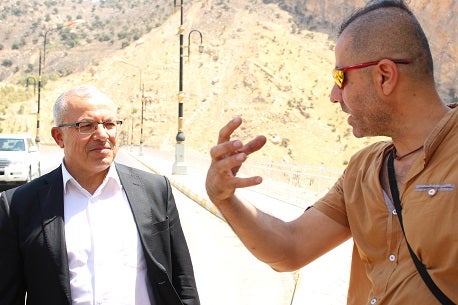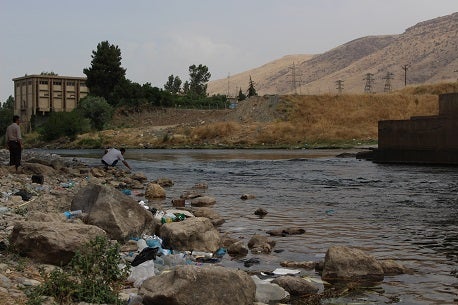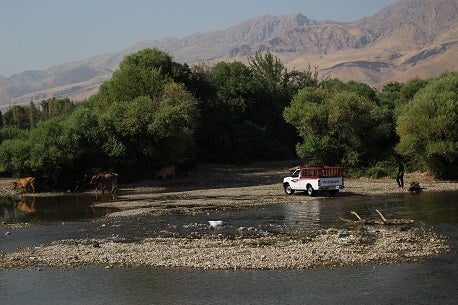In Erbil, wastewater and sewage are directed into channels that end up in a field outside the city where it is “neglected,” said Masood Karrash, director general of Erbil’s Water and Sewage department.
On the outskirts of Sulaimani a stream of blackwater merges with Tanjero River and the currents carry the waste downstream and pollute the water supply of towns further down the river.
Individual citizens, environmental activists, scientists, and government officials agree that waste management is a serious issue in the Kurdistan Region.

Waterkeeper Nabil Musa (right) gestures while in conversation with Darbandikhan Mayor Nasih Hassan (left) standing on the Darbandikhan hydroelectric dam.
Neglected by the Iraqi central government for decades, the Kurdistan Region’s infrastructure is behind what it should be. During the prosperous years between 2003 and 2013, the Kurdish government decided to first focus on delivering water to people then deal with waste management, said Karrash.
Today, as the Region starts to recover economically after more than three years of a financial crisis, it is beginning to address the blackwater problem.
In Erbil, they have agreed on a $350 million loan from the Japanese International Cooperation Agency (JICA) and are at the tendering stage of a project to build a wastewater treatment plant. The hope is to begin construction in the first quarter of 2018.
Plans in Sulaimani are a step ahead of Erbil. The UK company Biwater should begin construction on a wastewater treatment plant by the end of the year, according to Karrash. The company declined to comment on their project, citing privacy.
It’s not, however, just municipal waste that is the problem. Everyone from oil companies to picnicking families are guilty of dumping their waste into the environment. Plastic bottles and bags are a particular scourge, lining the roads and floating in the rivers.
“That is one of the big problems for us. I don’t know if it is the culture…” said Karrash, explaining that dumping waste in the environment is a pervasive problem not done by just one or a few people and will need time to be resolved.

People stand along the shores of the Smaller Zab.
“We may have beautiful nature, we have best elements of the environment like soil, water, and the air, but I think we are in danger,” she said.
Faraidun organizes the Earth Network of seven Kurdish NGOs working to promote awareness of environmental issues.
Public lack of knowledge is one of the biggest problems, she said, coupled with the inability of scientific researchers to influence the politicians.
In Darbandikhan, 70 kilometres downriver of Sulaimani, Mayor Nasih Hassan said waste being brought down the river from urban centres upstream is his town’s major concern. They are no longer able to take drinking water from the river.
While the waste from Sulaimani is out of his control, Hassan did try what he could to clean up the river by shutting down gravel mines that disrupt the river’s flow and stir up heavy sediment killing the aquatic life.
After six months, he said, they noticed a big improvement in water quality and lots of fish returned. It did not last long, however. “Higher ups” called Hassan and told him to ease off the gravel miners.
In his struggle to protect the environment, Hassan is looking forward to building relations with an ally in the field - waterkeeper Nabil Musa.
“My role is to help people to think, to make them to wake up,” said Musa. “I’m trying my best as a waterkeeper to fight, to create a voice for all the rivers being abused by people, by companies, by the system, especially by the governments.”
The Waterkeeper Alliance was founded in 1999 by Robert F. Kennedy with the goal of campaigning for the right to swimmable, drinkable, fishable water.

A driver leaves after washing his truck in the Tanjero River.
Musa has been a waterkeeper in Kurdistan and Iraq for six years. He works through networking among groups and activists, education, awareness campaigns, and spurring people into assuming personal responsibility for the environment.
One recent project was to construct barriers to prevent access to the banks of the Tanjero River where drivers were washing their cars. Local officials, he said, took credit for the project in the media.
For Musa, this was the perfect situation, because by taking credit, the local officials have now assumed responsibility for maintaining the barriers and protecting that stretch of the river.
Now, where once hundreds of people washed the filth of their cars into the river every day, just a few intrepid drivers make it around the barriers. Not only have fish and frogs returned, but families are picnicking on the river bank.
Musa is in it for the long game. “I’m not just protecting the river. I’m protecting the Peshmerga’s kids, my kids, your kids, everybody’s life,” he explained.
“We have to realize not just to care about just my children, we have to care about everybody’s children. People downstream, we have to care about them. Keep this river, in front of your door, keep it clean because there are people down there and people further down and further down.”




Comments
Rudaw moderates all comments submitted on our website. We welcome comments which are relevant to the article and encourage further discussion about the issues that matter to you. We also welcome constructive criticism about Rudaw.
To be approved for publication, however, your comments must meet our community guidelines.
We will not tolerate the following: profanity, threats, personal attacks, vulgarity, abuse (such as sexism, racism, homophobia or xenophobia), or commercial or personal promotion.
Comments that do not meet our guidelines will be rejected. Comments are not edited – they are either approved or rejected.
Post a comment